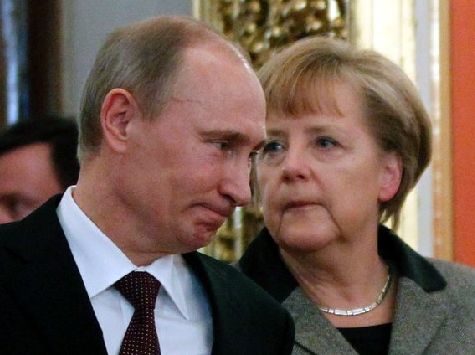Americans frustrated by German Chancellor Angela Merkel’s reluctance to meet demands for stronger sanctions against Russia have now begun to ask if there is a good reason the German leader has been targeted by US spies.
Questions are being raised about Merkel’s early life in totalitarian East Germany, the extent of her ties to its communist regime and her history as “an ardent Russophile” in Soviet-dominated East Germany.
Last year, in information leaked to the German news magazine Der Spiegel by former US National Security Authority contractor Edward Snowden, Merkel learned that the US intelligence service had been tapping her personal mobile phone since 2002.
The tap was part of a mass surveillance of European leaders by joint US and British intelligence.
In a furious confrontation with President Barack Obama Merkel compared the snooping practices of the U.S. with those of the Stasi, the secret police of the communist dictatorship in East Germany.
Subsequently the Obama administration refused to give Berlin a “no spying pact,” but agreed to stop spying on Merkel personally.
Some Americans are now asking: was there a good reason the US needed to keep an eye on Merkel’s private conversations? As Reuters blogger Jack Shafer wrote when the story broke last year: “Just as Germany has yet to expunge its Nazi past, its eastern, totalitarian provinces have not come close to expunging their Communist past.”
“The longitudinal interest by the US in all things Merkel may be informed by her past. She was a citizen of East Germany before reunification, and her personal history has long been controversial.”
One Washington foreign policy expert, who did not wish to be named, this week described Merkel to Breitbart London as “a former member of the East German Communist Party who functioned as a mid-level propaganda commissar for the Free German Youth, that is, the young Communists.”
“She and the then-KGB operative Putin, who is fluent in German, were active in East Germany at the same time. Whether they met or worked together, I don’t know, but they were both in the same line of work.”
In April Cliff Kincaid, a director of the AIM Center for Investigative Journalism, wrote “Merkel was known to be suspiciously pro-Russian when she ran for high office in Germany but that her political party, the Christian Democrats, nominated her anyway.”
Kincaid notes that Merkel “grew up in the formerly communist East Germany and spent 35 years of her life under the dictatorship.”
Germany’s increasing dependence on Russian energy imports “is related to Merkel’s decision, after the accident at the Fukushima nuclear plant in Japan, to phase out Germany’s nuclear energy program.”
Kincaid refers to a book by Günther Lachmann and Ralf Georg Reuth called The First Life of Angela M. He says the book suggests “that she had deeper ties to the communist regime than previously known or acknowledged.”
“She has admitted joining the Free German Youth, the communist youth organisation, and a photo has surfaced showing her in a communist uniform. But the book argues that she hid her role in the youth group as secretary for agitation and propaganda, instead depicting herself as someone engaged in ‘cultural’ affairs.”
“One of Merkel’s defenders said she ‘couldn’t remember whether she was involved in agitation and propaganda.'”
But links with the old East Germany communist regime don’t end with Merkel: “Former German Chancellor Gerhard Schroeder went to work for the Russian state-owned energy giant Gazprom. He is described as a personal friend of Vladimir Putin and once called the Russian president a ‘flawless democrat.’ He has defended Russia’s invasion of Ukraine.”
Günter Guillaume, a top aide to Willy Brandt, a former West German Chancellor, was exposed as a spy for East Germany in 1974.

COMMENTS
Please let us know if you're having issues with commenting.